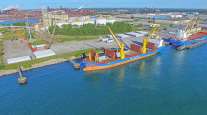Senior Reporter
Activity at US Ports Plummets as Coronavirus Slows World Economy

[Ensure you have all the info you need in these unprecedented times. Subscribe now.]
Activity at ports tracked by the Global Port Tracker fell in February to the lowest level in five years.
Imports accounted for 1.51 million 20-foot-equivalent unit containers in February, the latest data available. That was down 6.8% from the same time last year, and sequentially down 17% from January of this year.
“Even as factories in China have begun to get back to work, we are seeing far fewer imports coming into the United States than previously expected,” said Jonathan Gold, vice president of supply chain and customs policy at the National Retail Federation. “Many stores are closed, and consumer demand has been impacted with millions of Americans out of work.”
Estimated March imports hit five-year low, declines expected to continue amid pandemic. https://t.co/38B9IxxMo1 pic.twitter.com/K2nEGd6ff9 — National Retail Federation (@NRFnews) April 8, 2020
NRF and Hackett Associates produce the port tracker, which logs activity at the West Coast ports of Los Angeles, Long Beach and Oakland in California; and Seattle and Tacoma in Washington. The East Coast ports tracked are New York-New Jersey; Virginia; Charleston, S.C.; Savannah, Ga; and the Everglades, Miami and Jacksonville in Florida. And there’s the Houston port on the Gulf Coast.
The near-term outlook remains soft with double-digit losses. The Global Port Tracker forecast the first six months of 2020 to total 8.93 million TEUs, tumbling 15.1% from the same time a year ago.
Prior to the pandemic the forecast for the first half was 10.47 million TEUs.
While March results are not yet available, estimates are that imports could drop 21.3% to 1.27 million TEUs year-over-year — the lowest level since 1.21 million TEUs were processed in February 2015 during a labor dispute at West Coast ports.
April’s forecast is 1.44 million TEUs, a 17.6% drop year-over-year; May’s projection is 1.48 million TEUs, down 20.1%; for June the estimate is 1.41 million TEUs, down 21.4%; for July it’s 1.61 million TEUs, down 18.2%; and in August 1.72 million TEUs, down 12.5%.
“The COVID-19 pandemic is unraveling the economy nationally and globally as most of the world moves toward a lockdown that entails the closure of significant portions of both the service and manufacturing industries,” said Ben Hackett, founder of Hackett Associates. “The largest drop is forecast for the first half of this year, but with uncertainty about the length of the lockdown and extent of the pandemic, the second half may not be in better shape.”
Two issues of concern to port operators: First, the growing number of empty containers stored at ports as activity from Asia remains well below annual levels. And secondly, scant warehouse space since thousands of pallets of products ordered months ago are not being picked up by retailers because stores are temporarily shuttered.
Cary Davis, director of government relations at the American Association of Port Authorities, told Transport Topics getting the supply chain back in balance could take months.
“There is a backlog of empties. This has been going on for some time, and it’s largely a product of the blank sailings or canceled calls at ports. Now, these canceled calls result in a few different issues,” Davis said. “Some of the ports have been very effective at rebooking calls with different shipping lines to carry away the empties and some not so much.”
Paul Bingham, economist with IHS Markit, said retailers are concerned about having to spend money to ship items by truck or rail to stores when customers aren’t shopping.
“The warehouses and the stores are closed, and where is it going to sit when it comes off the ships? It’s going to sit in those terminals, and they’re going to start running up demurrage and have a problem with congestion.”
Demurrage is a charge due for the detention in port of a vessel by the shipowner, as in loading or unloading, beyond the time agreed upon.
All of those unmoved goods take up precious real estate.
The Federal Maritime Commission is asking for help from port directors, ocean carriers, trucking companies, railroads and others to keep the supply chain open.
“This initiative is an effort by the commission to do everything we can to eliminate the pressing problems in the freight delivery system,” said FMC Commissioner Rebecca Dye.
Want more news? Listen to today's daily briefing:




